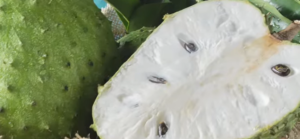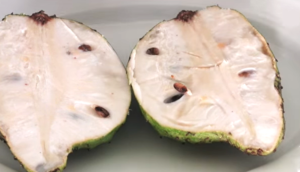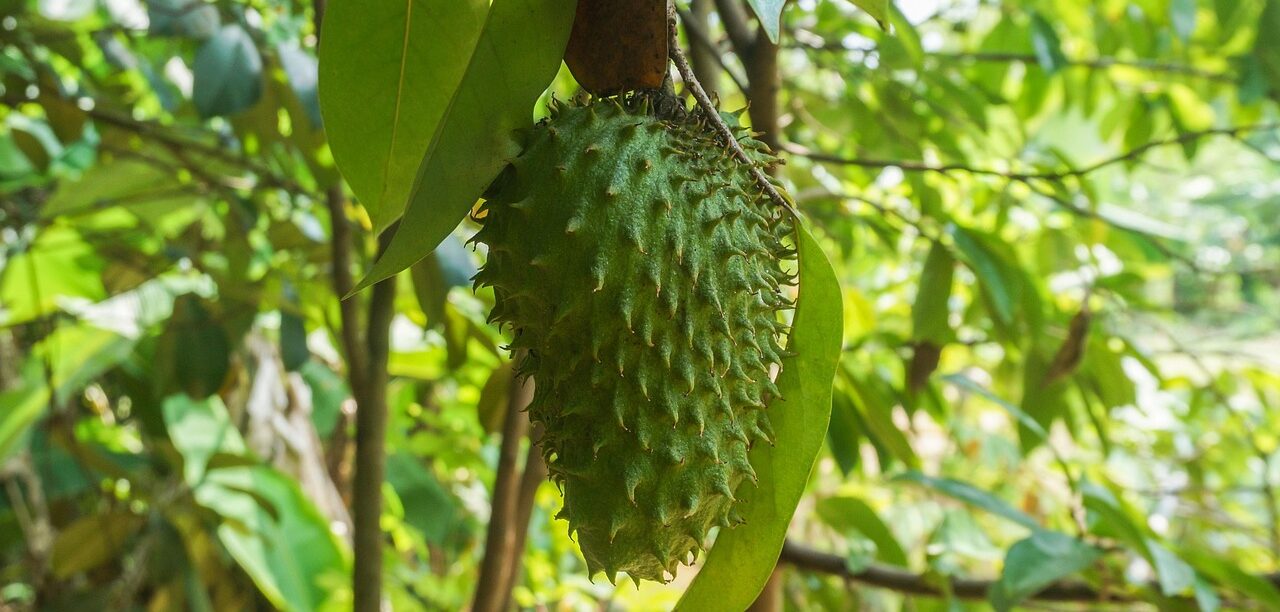Soursop, also known as guanabana, graviola, or guyabano, is a tropical fruit native to the Americas and the Caribbean. Here are some key details about soursop:
Description
- Appearance: The fruit is large and oval-shaped, with a green, prickly exterior. It can grow up to 8 inches (20 cm) long and weigh up to 10 pounds (4.5 kg).
- Flesh: Inside, the flesh is white, fibrous, and has a sweet, tangy flavor with notes of pineapple, strawberry, and citrus.
Nutritional Value
Per 100 grams of soursop, you’ll find:
- Calories: 66 kcal
- Water: 81.16 g
- Protein: 1.00 g
- Total Fat: 0.30 g
- Carbohydrates: 16.84 g
- Dietary Fiber: 3.3 g
- Sugars: 13.54 g
- Vitamin C: 20.6 mg (23% DV)
- Potassium: 278 mg (6% DV)

Health Benefits
Soursop is known for its numerous health benefits, including:
- Antioxidant Properties: Rich in vitamins A, C, and E, soursop helps reduce oxidative stress and supports immune health.
- Anti-inflammatory Effects: The fruit contains compounds that help relieve inflammation.
- Digestive Health: High in dietary fiber, soursop promotes digestive health and regularity.
- Potential Anticancer Properties: Some studies suggest that soursop may have anticancer properties, but more research is needed to confirm its effectiveness in humans.
Uses
- Consumption: Soursop can be eaten fresh, made into juices, smoothies, ice cream, and desserts.
- Medicinal Uses: The leaves and other parts of the plant are sometimes used in traditional medicine for various ailments.

Countries Where Soursop Is Commonly Found
Soursop grows in tropical and subtropical regions worldwide, including:
- Mexico
- Brazil
- Colombia
- Venezuela
- Peru
- Ecuador
- Costa Rica
- Cuba
- Puerto Rico
- Haiti
- Jamaica
- Dominican Republic
- Thailand
- Philippines
This fruit is widely appreciated not only for its unique taste but also for its potential health benefits and versatility in various culinary applications.
Research papers that discuss the anticancer properties of soursop (Annona muricata)
Chemometric Analysis and Quantification of Major Anti-Cancer Compounds in Soursop Leaves (Annona muricata Linn.): This research delves into the identification and measurement of anti-cancer compounds present in soursop leaves, utilizing various solvents. The study emphasizes the presence of annonacin and flavonoids, both known for their anticancer properties.
Pharmacological Properties of Soursop (Annona muricata Linn.): This review article explores the traditional uses, chemical composition, and pharmacological activities of soursop. It highlights that soursop contains acetogenins, alkaloids, and flavonoids, which are believed to contribute to its anticancer effects.
The Role of Soursop in Cancer Therapy: An In-Depth Review: This comprehensive review summarizes recent findings on the potential anti-cancer properties of soursop extracts. It discusses various phytochemicals found in soursop, including alkaloids, phenols, and acetogenins, and their impacts on different types of cancer.

